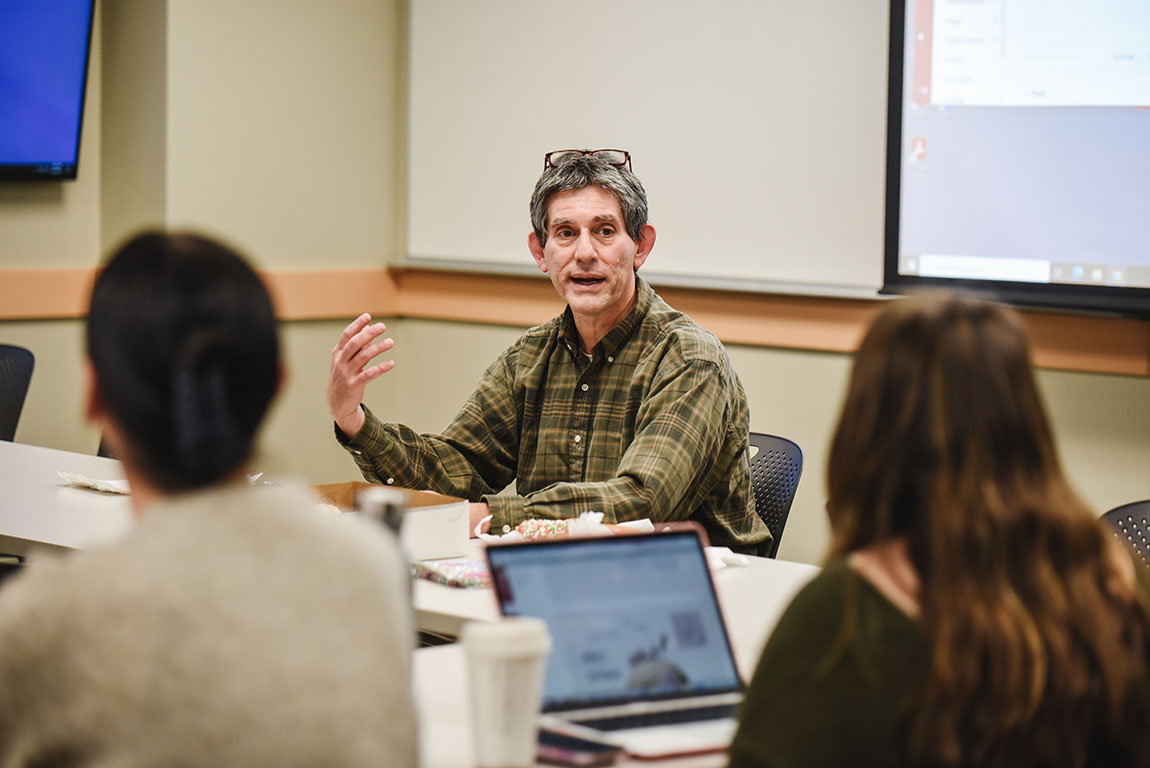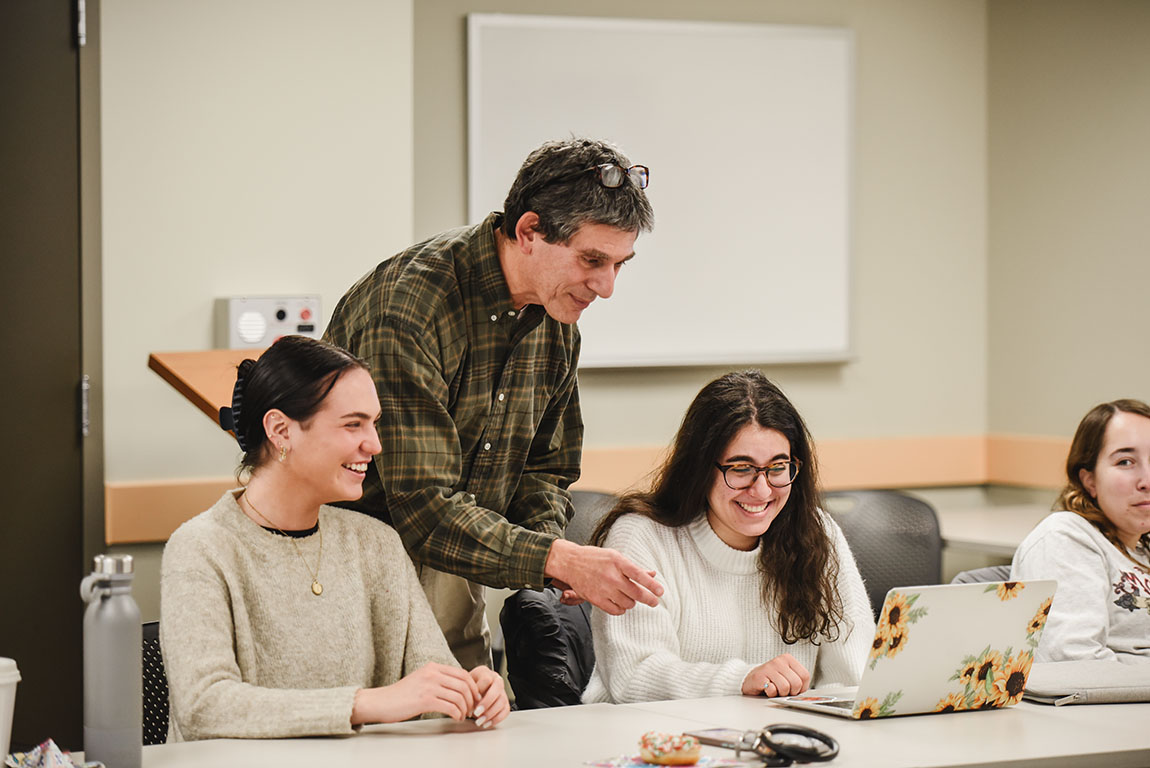An Eclectic Academic
Professor of Psychology Jeff Rudski combines both his own and his students’ interests to drive his research program, which has included studies on drugs, superstition and pop culture.By: Meghan Kita Wednesday, March 8, 2023 08:05 AM
.jpg) Professor of Psychology Jeff Rudski in his office with a collection of mugs students have given him. Photos by Kristi Morris
Professor of Psychology Jeff Rudski in his office with a collection of mugs students have given him. Photos by Kristi MorrisAs an undergrad, Professor of Psychology Jeff Rudski was inspired by an introductory psych professor who researched pain. Rudski had always been fascinated with the philosophical aspects of psychology, like the connection between mind and body. When Rudski learned in his intro class that placebo effects are nullified by the drug naloxone — better known today as Narcan, a nasal spray that can reverse opioid overdoses — he was smitten with the discipline.
“Just like that, the placebo effect vanishes and all the pain comes back. Something that was all in the mind was mediated by a physiological process in the brain,” Rudski says. “That grabbed me. It was challenging to me. It turned my whole world upside down. I said, ‘I’ve got to learn more about this.’”

He went on to earn a bachelor’s in biological psychology and a doctorate in experimental psychology with a focus in behavioral pharmacology. One of his broad areas of interest continues to be the intersection between drugs, neuroscience and sociology. (The other interest is why smart people hold irrational beliefs, including superstitions.) And this semester, Rudski is working on two drug-related research projects involving students. One aims to answer the question, who is the ‘real you’ when you take medication for depression? The other examines the role that scientific review plays in determining how drugs should be regulated.
Both projects are student-driven: A student wrote a paper related to the ‘real you’ project and Rudski suggested, “We should turn this into a study.” The second idea came from Rudski’s brainstorming notebook, which “has a couple hundred studies I would like to do if I had the time,” he says, and was tweaked to add questions of interest to his student collaborator.
Rudski describes his research program using a reference from the Pixar movie Up: Just as the film’s dogs are easily distracted by small animals (“SQUIRREL!”), Rudski tends to bounce from project to project depending on what’s most interesting to him — and his students — at that moment. (In 2007, for example, he worked with two Harry Potter superfans to study whether dedicated readers experienced withdrawal symptoms after the release of the series’ final installment.) He says that he is able to do this because he works at Muhlenberg, where close collaboration with students is valued just as much as a faculty member developing expertise in a specific area.

“Student questions challenge me to come up with new ideas and new ways of looking at things,” Rudski says. “Some of the research I do comes from questions students asked me in class that I didn’t necessarily know the answer to.”
Muhlenberg’s small, liberal arts environment is also a good match for Rudski’s teaching style. He assesses understanding partly through robust classroom discussion. Students in his Introductory Psychology course read the textbook and learn the concepts on their own, and Rudski uses class time to explore why the concepts matter. For example, after reading the textbook’s chapter on Pavlov’s dogs, students discuss how similar mechanisms drive implicit racism (e.g. when the news is constantly showing mugshots of darker-skinned people, the viewer starts to associate darker-skinned people with crime, which results in the development of implicit biases).
He also tries to instill in his students a willingness to make mistakes and learn from them. He shares his own backstory as inspiration. When he was an undergrad in Canada, where students do two years of community college before beginning a bachelor’s program, he did so poorly in the sciences during those first two years that he was rejected from the physiology major he hoped to pursue. He chose psychology instead, intending to raise his grades enough for the school to reconsider. After a year of being inspired by psychology, he was invited to switch majors, but he declined: His intro course hooked him, and he models his intro courses at Muhlenberg on the one he took.
As students progress in the psychology major, Rudski provides hands-on mistake-making opportunities. Students in Advanced Research, who work in teams to execute a study in a single semester, will sometimes design a study Rudski knows is unlikely to work out. Allowing the students to proceed ensures that they will learn from the experience.
“Every study [students] ever did in high school worked. If they did it right, it worked. They’re not used to failure. They take failure personally,” he says. “I want them to learn that science isn’t about proving your hypothesis. It’s about testing your hypothesis.”
This trial-and-error approach is pertinent to Rudski’s own research. For the depression medication study that’s underway now, he and one student initially gathered pilot data and presented it at a conference last May. Last summer, a second student collaborator continued the study with slightly altered methods. The group used both experiences to come up with the procedure they’re using now.
“I’m learning how to best do the study, too. It’s not just [the students] getting it wrong. It’s me getting it wrong,” Rudski says. “With all research, particularly when students are involved, it's fine if things don't initially go as planned. Mistakes can be identified. Plans can be changed. There’s a lot of learning in that process, not just for that particular study, but for life in general.”
